Manage: Domain
Table of Contents
- Introduction
- Add an ads.txt Record
- Add a Data Record
- Add a Variable
- Add a Comment
- Edit an ads.txt Record
- Importing an ads.txt File
- Synchronizing your ads.txt File
- Collaborating with Ad Networks
- Approving Collaborator Invites
- Requesting Collaboration
- ads.txt Version Control
The 'Manage >> yourdomain.com' section is used to manage the ads.txt records for your website.
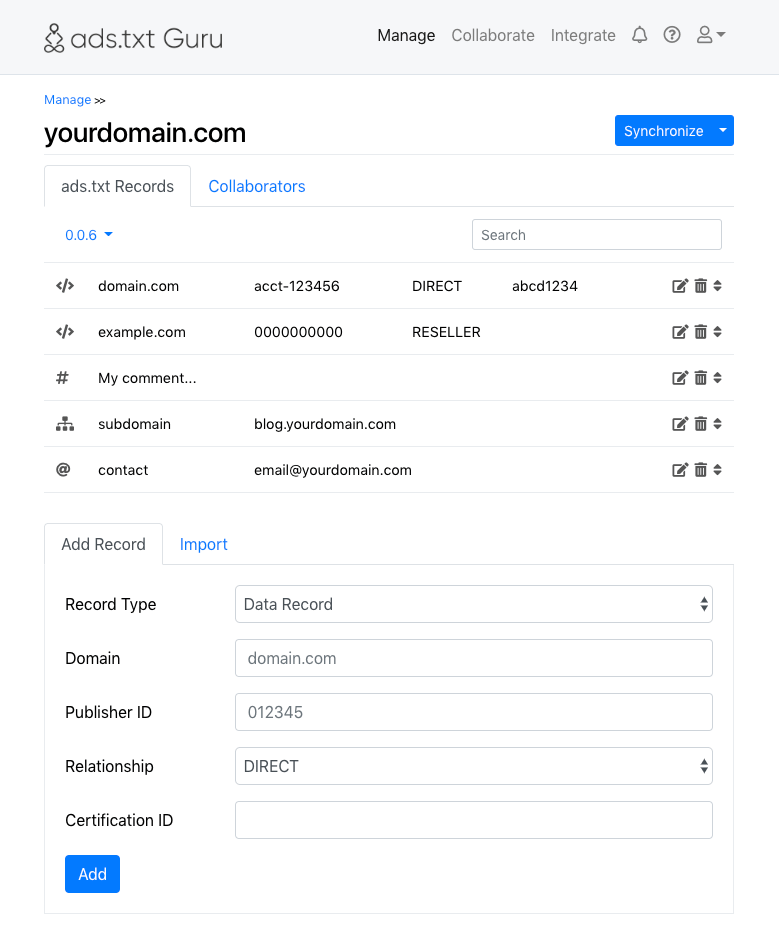
Your ads.txt records are shown in the 'ads.txt Records' table along with a series of icons which provide various features.
This icon indicates this is a 'Data Record', the fundamental record used to identify which ad networks can serve ads on your website.
This icon indicates this is a 'Subdomain Variable', these records are used to inform ads.txt crawlers that an additional ads.txt file exist on this subdomain which should be crawled.
This icon indicates this is a 'Inventory Partner Domain Variable', these records are used to inform ads.txt crawlers that an additional ads.txt file exist on this domain which should be crawled.
This icon indicates this is a 'Contact Variable', these records are used to provide human readable contact information for the owner of the ads.txt files.
This icon indicates this is a 'Comment', comments can include any text to help you organize your ads.txt file. Comments can be optionally excluded from your generated ads.txt file via the 'Settings' section.
Select this icon to edit this ads.txt record.
Select this icon to remove this ads.txt record.
Select this icon to sort/re-order this ads.txt record. Simply click and hold on this icon, and then drag the record to the desired position.
Add an ads.txt Record
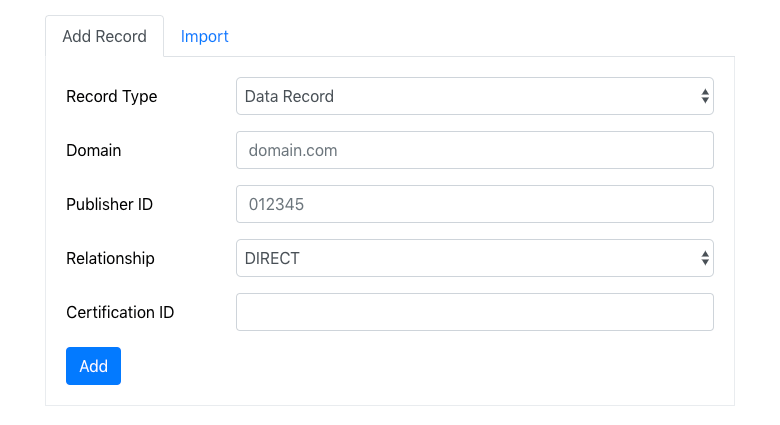
To add an ads.txt record select the 'Record Type':
-
Data Record
The fundamental record used to identify which ad networks can serve ads on your website.
-
Variable
Used to set subdomain, inventorypartnerdomain and contact records.
-
Comment
Comments can include any text to help you organize your ads.txt file.
Add a Data Record
-
Domain
The domain field is used to specify the domain name of the ad network which is authorized to sell advertising on your website. We recommend you use only the base domain name without any subdomain, however some ad networks may request you specify a subdomain.
For example, domain.com or ads.domain.com
-
Publisher ID
The publisher ID field is used to specify the account ID which is authorized to sell advertising under the ad network you have specified.
For example, if your account ID with this ad network is abcd-1234 then this should be entered in the Publisher ID field.
-
Relationship
The relationship field indicates whether the publisher ID account is managed by the website owner, or whether it is managed by a third-party on behalf of the website owner.
Selecting DIRECT indicates the website owner manages the account, selecting RESELLER indicates the account is managed by a third-party.
-
Certification ID
The Certification ID field is optional and a value does not need to be provided. This field is used to specify a unique ID which identifies the ad network with the Trustworthy Accountability Group (aka TAG).
Add a Variable
-
Type
The type field allows you to specify whether you are adding a contact or a subdomain record.
-
Contact Value
If you are adding a contact variable you may enter an email address, the URL of a contact page, or any plain-text such as the postal address.
For example, email@domain.com, http://yourdomain.com/contact/ or Company, Address, Country, 01234
-
Subdomain Value
If you are adding a subdomain you should enter the full subdomain and domain, without any protocol or trailing slash.
For example, blog.yourdomain.com
-
Inventorypartnerdomain Value
If you are adding a inventorypartnerdomain you should enter the full domain, without any protocol or trailing slash.
For example, domain.com
Add a Comment
-
Comment
The comment field allows you to enter any text for your own purposes. Comments are ignored by ads.txt crawlers and simply allow you to make notes to organize your ads.txt file. For compatibility it is recommended you only use standard characters and punctuation, and avoid using symbols and unusual characters.
Edit an ads.txt Record

To edit an ads.txt record select the Edit icon, the record will then show input fields which behave exactly like the 'Add Record' form.
Once you have made your changes simply select the Save icon to save your changes, or alternatively select the Cancel icon.
Importing an ads.txt File
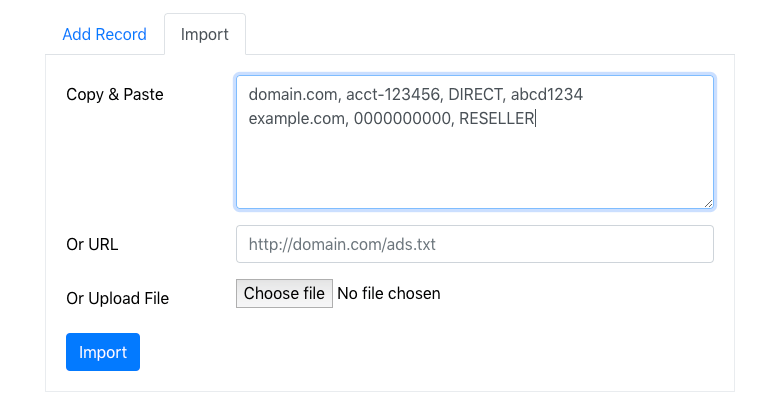
If you have an existing ads.txt file you can quickly and easily import it. You can either copy & paste the contents of your ads.txt file, enter the URL of your ads.txt file, or upload your ads.txt file from your computer.
Once your import has been processed you will be notified of any records which could not be imported due to errors. It is very important you review these errors carefully and then manually add any records which could not be imported, with the errors ammended.
The import process will ignore any duplicate records which do not need to be added.
Synchronizing your ads.txt File
Whenever you make changes to your ads.txt file you will be prompted to 'Synchornize' your changes, this updates the actual ads.txt file on your website to ensure it is up-to-date.
If you complete the 'Connect FTP' process then your ads.txt file can be synchronized automatically by clicking the 'Synchronize Now' button - when selected your ads.txt file will be automatically uploaded via FTP.
If you have not completed the 'Connect FTP' process then you will need to manually upload your ads.txt file, to do so simply select to download your ads.txt file and then upload it using your own FTP software or file manager. Once uploaded simply select the 'Synchronize Now' button and your uploaded ads.txt file will be verfied to ensure it has been uploaded correctly.
If you have completed the 'Connect FTP' process then you can enable the 'Auto-Synchronize' option to automatically upload your ads.txt file when you make changes. This typically occurs one hour after your first change to allow you time to make further changes, or resolve any mistakes.
Collaborating with Ad Networks
Collaboration allows ad networks to control their records within your ads.txt file. This is hugely beneficial as it allows your ad networks to make changes to their ads.txt records without your intervention, this allows for faster changes and less lost revenue.
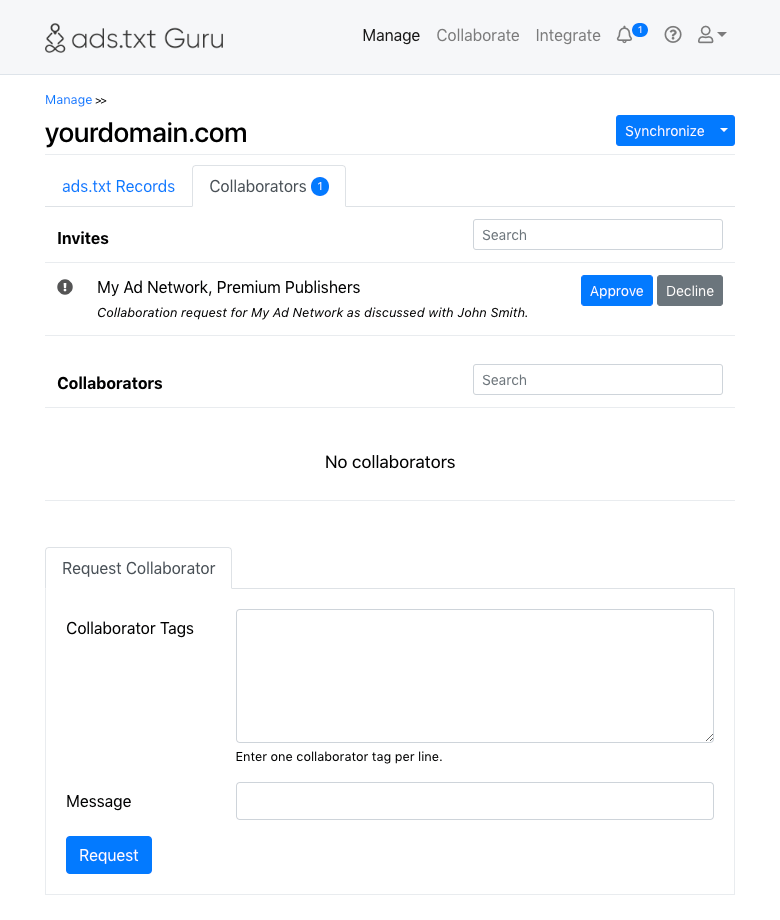
The 'Collaborators' section shows you any groups you are collaborating with, along with an icon which you can select to Remove each collaborator.
To the left of each collaborator group you will be shown an icon indicating whether the collaborator has completed our certification process and can be considered as 'Trusted'.
This icon indicates the collaborator has not completed certification and therefore we will identify this group as 'Not Trusted'. You should not collaborate with this group unless you are satisfied it is genuinely managed by your trusted ad network.
This icon indicates the collaborator has completed certification and can be trusted as a genuine ad network. You should still ensure you are satisfied this is a genuine ad network which you use to serve advertising on your website. Whilst we certify the organization managing the group, we can not certify that this is the correct organization that you use for your advertising.
Approving Collaborator Invites
If you provide your domain tag to your ad network then they can invite you to collaborate with their group. Invitations will be shown along with an optional message from the collaborator, this should be used to help you verify the collaborator is genuine. You can then choose to approve or decline collaboration.
Once approved the collaborators ads.txt records will be automatically included in your ads.txt file, and you will need to synchronize your ads.txt file accordingly.
You can find your domain tag under the 'Settings' section for your domain.
Requesting Collaboration
If your ad network has provided you with their collaborator tag then this can be entered in the 'Request Collaborator' form. We recommend you include a message to clarify who you are, for example you may wish to include your account username for the relevant ad network (please never include your password).
Once you have requested collaboration the ad network will in-turn need to approve your request, except when they have enabled automatic approval.
Once approved the collaborators ads.txt records will be automatically included in your ads.txt file, and you will need to synchronize your ads.txt file accordingly.
ads.txt Version Control
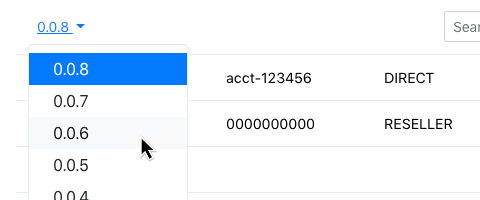
If you make a mistake, or would simply like to revert to an older version of your ads.txt file you can select the ads.txt version number to view a list of past versions.
Once you have selected a past version you will be shown the records for that version, along with an option to revert to that version. When reverting the selected version will become the latest version, you can of course revert to the previous latest version at any time.
If you are collaborating with any ad publishers then these records will be automatically included when you revert to a previous version, even if those records weren't originally present in that version - to remove these collaborators records you must remove the collaborator.
Usage Documentation
- Collaborate
- Collaborate: Collaborator Certification
- Collaborate: Group
- Collaborate: Group: Settings
- Getting Started Guide for Ad Networks
- Getting Started Guide for Publishers
- Manage
- Manage: Domain
- Manage: Domain: Settings
- Manage: Domain: Settings: Connect FTP
- Manage: Domain: Settings: Connect Hosting
- Manage: Domain: Settings: Connect WordPress
- Manage: Domain: Verify Domain